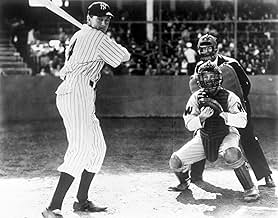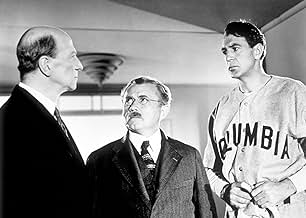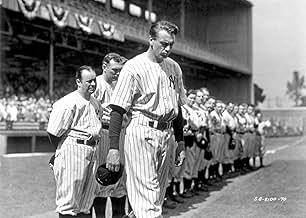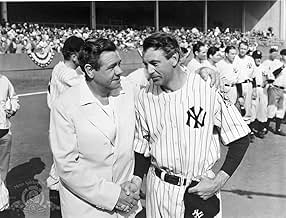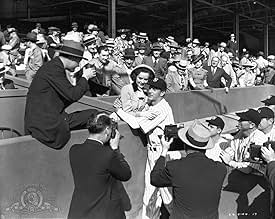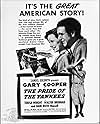The story of the life and career of famed baseball player Lou Gehrig.The story of the life and career of famed baseball player Lou Gehrig.The story of the life and career of famed baseball player Lou Gehrig.
- Won 1 Oscar
- 1 win & 10 nominations total
Ludwig Stössel
- Pop Gehrig
- (as Ludwig Stossel)
Bob Meusel
- Robert W. Meusel
- (as Robert W. Meusel)
Storyline
Did you know
- TriviaIn reality, Gary Cooper was decidedly not a fan of baseball and required extensive coaching in order to look even passable on a baseball diamond. In fact, he had never played the game before, even as a youth, and had never even seen a baseball game in person until he was hired for this film.
- GoofsAs Gehrig (Cooper) is doing his homework at Columbia, he writes with his right hand. Whilst Gehrig batted and threw left-handed, like many lefties of the era (perhaps because of "correction" in school), he wrote with his right hand.
- Quotes
[last lines]
Lou Gehrig: [his farewell speech]
Lou Gehrig: Today, I consider myself the luckiest man on the face of the earth... play ball!
- Crazy creditsOpening credits acknowledgment: Appreciation is expressed for the gracious assistance of Eleanor Gehrig (as Mrs. Lou Gehrig) and for the cooperation of Ed Barrow (as Mr. Ed Barrow) and the New York Yankees arranged by Christy Walsh.
- Alternate versionsA colorized version is available.
- ConnectionsFeatured in Diamonds on the Silver Screen (1992)
- SoundtracksTake Me Out to the Ball Game
(1908) (uncredited)
Music by Albert von Tilzer
Played during the opening credits and often in the score
Featured review
The only reason I don't give this film a perfect 10 is that I think Gary Cooper was a bit too old to be playing Lou Gehrig as a youth. Cooper was 41 when Pride of the Yankees was made. He was two years older than Lou Gehrig actually was.
While not terribly convincing as a college age Gehrig at Columbia University, the part of Gehrig grew into Cooper as Gehrig aged cinematically. And of course his recreation of Lou Gehrig's farewell to baseball got him an Oscar nomination.
Henry Louis Gehrig, child of German immigrants who grew up in the Yorkville section of Manhattan, was arguably the greatest first baseman baseball has ever known. He certainly has very few competitors for the honor. His famous record of 2130 consecutive games was bettered about a decade ago by Cal Ripken, but he still holds the major league record for lifetime grand-slam home runs, 23 and the American League RBI record for a single season, 184. He is one of a select group of ballplayers to have won the Triple Crown, he did that in 1934. His lifetime batting average of .340 is only topped by a handful.
He was as writer Frank Graham put it, baseball's "quiet hero." Until he was forced from baseball by the disease he gave his name to Gehrig played second fiddle to the flamboyant Babe Ruth and then to a graceful rookie named Joe DiMaggio.
The facts of Gehrig's life are somewhat jumbled in this film for dramatic coherency, but the essence of his character is brought out in the script by Paul Gallico. In fact Gallico wrote himself into the film as sportswriter Sam Blake as played by Walter Brennan.
Gary Cooper and Lou Gehrig and Teresa Wright as Eleanor Twitchell Gehrig both received Oscar nominations for their portrayals.
It should also not be forgotten that Lou Gehrig was a German American and I believe one of the reasons the film was made was that at that time we were fighting Germany. The German American Bund had its following and very much so in Lou Gehrig's Yorkville neighborhood. German Americans certainly had other and better role models than the Bund.
I remember as a lad going to Yankee old-timers games and there was always a moment of reverential silence when the Yankee widows, Claire Hodgson Ruth and Eleanor Twitchell Gehrig were always introduced. Both survived their husbands by many years.
In fact when Teresa Wright died this past year when the roll call of former Yankees who had passed on her name was read out among all the ballplayers. It was a fitting tribute to a great actress and a woman who didn't know a thing about baseball before she did this film, but became a devoted fan afterward. I guess that was her private tribute to Lou Gehrig.
There is still no cure for amytrophic lateral sclerosis or now known as Lou Gehrig's Disease. A lot of other noted persons have passed on from it, Jacob Javits, David Niven, Ezzard Charles, Dennis Day and former Vice President Henry A. Wallace. Still we can hope for a dedicated and inspired scientist to find a cure.
Until then we have this inspirational movie and Lou Gehrig's inspired and remembered life.
While not terribly convincing as a college age Gehrig at Columbia University, the part of Gehrig grew into Cooper as Gehrig aged cinematically. And of course his recreation of Lou Gehrig's farewell to baseball got him an Oscar nomination.
Henry Louis Gehrig, child of German immigrants who grew up in the Yorkville section of Manhattan, was arguably the greatest first baseman baseball has ever known. He certainly has very few competitors for the honor. His famous record of 2130 consecutive games was bettered about a decade ago by Cal Ripken, but he still holds the major league record for lifetime grand-slam home runs, 23 and the American League RBI record for a single season, 184. He is one of a select group of ballplayers to have won the Triple Crown, he did that in 1934. His lifetime batting average of .340 is only topped by a handful.
He was as writer Frank Graham put it, baseball's "quiet hero." Until he was forced from baseball by the disease he gave his name to Gehrig played second fiddle to the flamboyant Babe Ruth and then to a graceful rookie named Joe DiMaggio.
The facts of Gehrig's life are somewhat jumbled in this film for dramatic coherency, but the essence of his character is brought out in the script by Paul Gallico. In fact Gallico wrote himself into the film as sportswriter Sam Blake as played by Walter Brennan.
Gary Cooper and Lou Gehrig and Teresa Wright as Eleanor Twitchell Gehrig both received Oscar nominations for their portrayals.
It should also not be forgotten that Lou Gehrig was a German American and I believe one of the reasons the film was made was that at that time we were fighting Germany. The German American Bund had its following and very much so in Lou Gehrig's Yorkville neighborhood. German Americans certainly had other and better role models than the Bund.
I remember as a lad going to Yankee old-timers games and there was always a moment of reverential silence when the Yankee widows, Claire Hodgson Ruth and Eleanor Twitchell Gehrig were always introduced. Both survived their husbands by many years.
In fact when Teresa Wright died this past year when the roll call of former Yankees who had passed on her name was read out among all the ballplayers. It was a fitting tribute to a great actress and a woman who didn't know a thing about baseball before she did this film, but became a devoted fan afterward. I guess that was her private tribute to Lou Gehrig.
There is still no cure for amytrophic lateral sclerosis or now known as Lou Gehrig's Disease. A lot of other noted persons have passed on from it, Jacob Javits, David Niven, Ezzard Charles, Dennis Day and former Vice President Henry A. Wallace. Still we can hope for a dedicated and inspired scientist to find a cure.
Until then we have this inspirational movie and Lou Gehrig's inspired and remembered life.
- bkoganbing
- Dec 20, 2005
- Permalink
Details
- Runtime2 hours 8 minutes
- Color
- Aspect ratio
- 1.37 : 1
Contribute to this page
Suggest an edit or add missing content

Top Gap
By what name was The Pride of the Yankees (1942) officially released in India in English?
Answer

